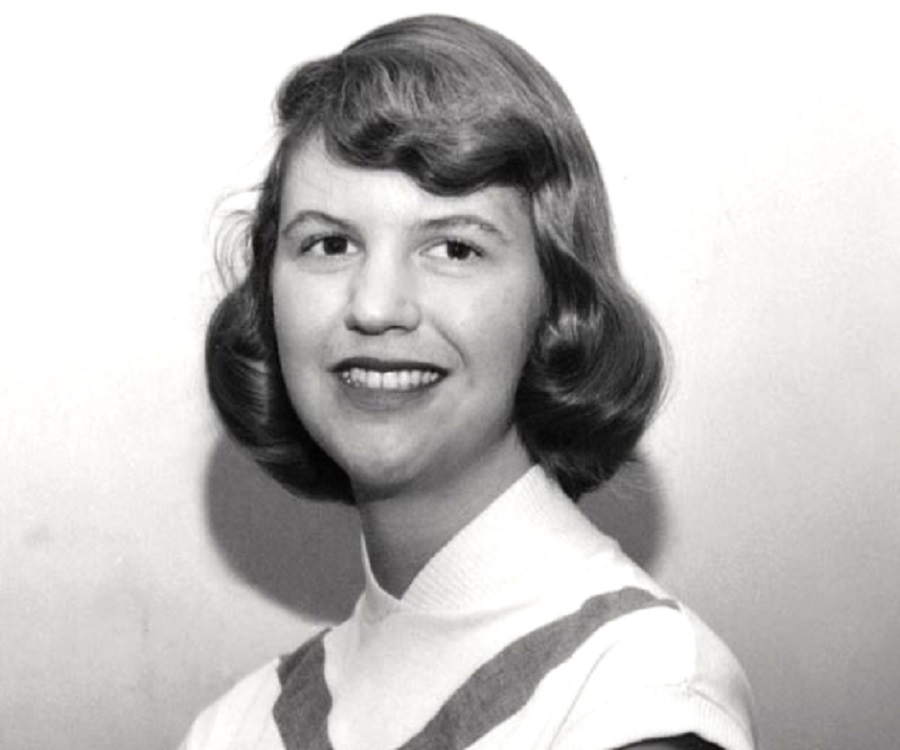Discovering Sylvia Plath: Life, Work, And Lasting Legacy
Was Sylvia Plath simply a tragic figure, or was she a literary revolutionary whose unflinching honesty paved the way for generations of female writers? She remains a pivotal, albeit controversial, figure in 20th-century literature, and understanding her life is inseparable from appreciating the raw power of her words. Sylvia Plath, the Boston-born poet, novelist, and essayist, etched her name into the annals of literature with works that resonate with both beauty and pain. Her brilliance, however, was often overshadowed by a life punctuated by mental health struggles and personal turmoil. Today, Plath is recognized not just as a sufferer, but as a literary titan whose voice continues to challenge and inspire.
This exploration aims to dissect the multifaceted layers of Plath's life and work, shedding light on the themes that course through her prose and poetry. We will examine the influences that shaped her unique perspective and assess her enduring impact on modern literature and feminist thought. By tracing the trajectory of her journey, we hope to gain a more nuanced understanding of the complexities that fueled her creative fire, as well as the cultural backdrop against which she operated. Her contributions to literature are undeniable, her struggles deeply human, and the factors that catapulted her to iconic status, worthy of examination.
| Attribute | Details |
|---|---|
| Full Name | Sylvia Plath |
| Born | October 27, 1932, Boston, Massachusetts |
| Died | February 11, 1963, London, England |
| Occupation | Poet, Novelist, Essayist |
| Notable Works | The Bell Jar, Ariel, The Colossus, The Collected Poems |
| Literary Movement | Confessional Poetry |
| Spouse | Ted Hughes (m. 1956; separated 1962) |
| Children | Frieda Hughes, Nicholas Hughes |
| Education | Smith College, Newnham College (Cambridge University) |
| Awards | Pulitzer Prize for Poetry (posthumously, 1982) for The Collected Poems |
| Official Website | SylviaPlath.info |
Sylvia Plath's early life was steeped in the academic atmosphere fostered by her father, Otto Plath, a German immigrant and a professor of biology specializing in bees. Her mother, Aurelia Schober Plath, a former nurse, provided a nurturing environment that initially fostered Plath's precocious literary inclinations. Growing up in the relatively sheltered milieu of the Boston suburbs, Plath demonstrated an exceptional aptitude for writing at a young age. The publication of her first poem at the tender age of eight was a harbinger of the literary heights she would eventually scale. Aurelia Plath, acutely aware of her daughter's talent, actively encouraged her literary pursuits, nurturing her creative spark with unwavering support.
- Rebecca Crews Brave Breast Cancer Battle Inspiring Story
- Royal Flashback Camilla As Flower Girl See The Charming Pic
Her academic journey led her to Smith College, a prestigious institution where she excelled in her studies and immersed herself in the vibrant literary scene. Plath distinguished herself by winning numerous accolades for her writing, solidifying her reputation as a promising literary talent. However, beneath the veneer of academic success and literary acclaim lurked a growing struggle with mental health. The summer of 1953 proved to be a watershed moment in Plath's life, marked by a profound crisis that culminated in a suicide attempt. This harrowing experience left an indelible mark on her psyche and would profoundly influence the thematic landscape of her subsequent literary works. The attempt became a critical juncture, informing much of her subsequent work, adding layers of authenticity to her depiction of mental anguish.
Following her recovery from the devastating events of 1953, Plath demonstrated remarkable resilience by returning to Smith College and successfully completing her degree. Her academic achievements earned her a prestigious Fulbright Scholarship, which provided her with the opportunity to further her studies at the University of Cambridge in England. This transatlantic journey marked a pivotal chapter in her life, for it was within the hallowed halls of Cambridge that she encountered Ted Hughes, a fellow poet whose literary talent and charismatic personality captivated her. Their meeting sparked a passionate and intense romance that culminated in their marriage in 1956. However, their relationship, while initially a source of creative inspiration, would later become a crucible of emotional turmoil, leaving an indelible mark on Plath's artistic output.
Plath's early literary endeavors encompassed a diverse range of genres, including short stories, poems, and essays. However, her breakthrough came with the publication of her semi-autobiographical novel, The Bell Jar, in 1963. Published under the pseudonym Victoria Lucas, the novel offered a searing and unflinching portrayal of a young woman's descent into mental illness. The Bell Jar resonated deeply with readers, particularly women, who identified with the protagonist's struggles against societal expectations and the suffocating constraints placed upon female ambition. The novel's raw honesty and unflinching depiction of mental anguish established Plath as a significant voice in contemporary literature, solidifying her reputation as a writer who dared to confront taboo subjects with unflinching candor.
- Olivia Peet The Untold Story Behind Ludvig Abergs Partner
- Bravo Fan Fest Miami 2024 Tickets Dates What To Expect
The Bell Jar stands as a testament to Plath's courage in confronting the often-stigmatized topic of mental illness. Through the eyes of Esther Greenwood, the novel's protagonist, Plath explores the insidious nature of depression and the debilitating effects of societal pressures on women in the 1950s. Esther's experiences mirror Plath's own struggles with mental health, creating a powerful and authentic narrative that resonates with readers who have experienced similar challenges. The novels enduring appeal lies in its unflinching portrayal of the inner turmoil that often remains hidden beneath a facade of normalcy. It's a powerful statement on the suffocating expectations placed upon women and the desperate search for identity in a world that often seeks to define them.
Plath's posthumously published poetry collection, Ariel, is widely regarded as her magnum opus, a testament to her poetic genius and her unparalleled ability to transform personal pain into art. The poems in Ariel are characterized by their raw intensity, their vivid imagery, and their unflinching exploration of themes such as death, despair, and the search for meaning in a chaotic world. Iconic poems such as "Lady Lazarus" and "Daddy" have become touchstones of modern poetry, celebrated for their confessional style and their unflinching portrayal of female rage and vulnerability. The collection remains a powerful testament to Plath's innovative use of language and her willingness to confront the darkest aspects of the human experience. Ariel cemented her legacy as one of the most important poets of the 20th century.
The publication of The Collected Poems in 1981 marked a watershed moment in Plath's posthumous recognition. This comprehensive collection brought together her entire body of poetic work, showcasing the evolution of her style and the breadth of her thematic concerns. The collection was awarded the Pulitzer Prize for Poetry in 1982, solidifying Plath's status as a literary giant and affirming the enduring power of her poetic voice. The Collected Poems remains an essential resource for scholars and readers seeking to understand the full scope of Plath's literary contributions.
Several recurring themes permeate Sylvia Plath's writing, providing a framework for understanding her complex and often-conflicting perspectives. Identity and Self-Exploration: Plath's works are deeply personal, often delving into her own sense of self and the challenges of navigating a patriarchal society as a woman. She grappled with societal expectations, personal ambitions, and the search for a coherent identity in a world that often sought to define her on its own terms. Mental Illness: Plath's candid portrayal of her own struggles with depression and anxiety is a defining characteristic of her writing. She fearlessly explored the stigma surrounding mental health, offering readers a glimpse into the often-unseen realities of mental anguish. Death and Despair: Themes of mortality, loss, and the search for meaning in a chaotic world are recurring motifs in Plath's poetry. Her poems often grapple with the inevitability of death and the profound sense of despair that can accompany the human experience. Nature and the Female Experience: Plath frequently drew parallels between the natural world and the female experience, using vivid imagery to convey emotions and explore the connections between women and the environment. This intersection of nature and femininity is a recurring theme that adds depth and complexity to her work.
Sylvia Plath's legacy extends far beyond her individual works. Her impact on literature and feminist thought is profound and enduring. She is widely recognized as a pioneer of confessional poetry, a style that emphasizes personal experiences and emotional honesty. Plath's willingness to confront taboo subjects and explore the complexities of female identity paved the way for generations of women writers who followed in her footsteps. Her exploration of mental health issues has also contributed to a broader societal conversation about mental illness, helping to destigmatize mental health challenges and foster greater understanding and empathy.
In recent years, Plath's life and work have experienced a resurgence in popularity, with numerous adaptations of her story appearing in film, theater, and other media. Her story continues to resonate with readers, particularly young women who find solace and inspiration in her exploration of identity, personal struggles, and the search for meaning in a complex world. The enduring appeal of Plath's work speaks to the timelessness of her themes and the power of her poetic voice. Her unwavering commitment to honesty and her willingness to confront the darkest aspects of the human experience continue to captivate and challenge readers around the world, ensuring that her legacy will endure for generations to come.
Plath's unflinching exploration of her own mental health is an integral aspect of her literary legacy. By candidly addressing her experiences with depression in her poetry and prose, she provided readers with invaluable insights into the complexities of the human psyche. Her openness and honesty helped to destigmatize mental illness, fostering discussions about mental health in literature and society. Many readers find solace and validation in Plath's reflections on mental health, recognizing their own struggles mirrored in her words. Her poignant exploration of despair has become an important part of the literary canon, contributing to a greater awareness and understanding of mental health issues.



Detail Author:
- Name : Aida O'Connell
- Username : goldner.annamarie
- Email : jeffry.stoltenberg@terry.com
- Birthdate : 1978-02-11
- Address : 18638 Walter Fork Suite 994 North Lennieville, NV 29705-1795
- Phone : +1-704-894-0019
- Company : O'Keefe, Cormier and Moen
- Job : Mold Maker
- Bio : Exercitationem tempore earum et eligendi inventore. Omnis qui enim dignissimos ut. Soluta voluptatem repudiandae impedit ut aperiam omnis et at. Amet non voluptates voluptates amet.
Socials
tiktok:
- url : https://tiktok.com/@schimmelr
- username : schimmelr
- bio : Qui iste delectus deserunt quo quia saepe.
- followers : 706
- following : 876
twitter:
- url : https://twitter.com/royschimmel
- username : royschimmel
- bio : Occaecati sunt ad repellendus. Sed quas voluptatem provident. Aut unde aut voluptas voluptates. Unde reiciendis hic at reprehenderit.
- followers : 2447
- following : 778
linkedin:
- url : https://linkedin.com/in/rschimmel
- username : rschimmel
- bio : Neque et eos deserunt.
- followers : 703
- following : 1087